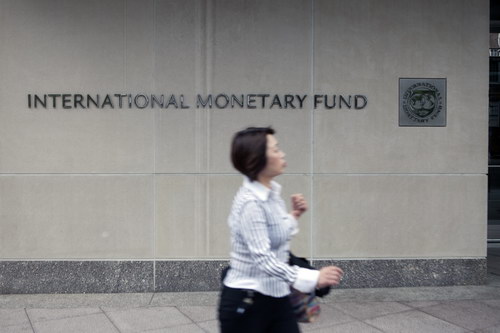IMF cuts China 2011-12 growth estimates
Updated: 2011-09-22 09:11
By Wei Tian (China Daily)
|
|||||||||
BEIJING - The International Monetary Fund (IMF) lowered its estimate for China's growth for this year and the next, reflecting domestic tightening policies and a pessimistic outlook for the global recovery.
 |
|
The headquarters of the International Monetary Fund in Washington. The organization has lowered its forecast for China’s economic growth in 2011 to 9.5 percent. [Photo/Agencies] |
The forecast for China's GDP growth this year was cut to 9.5 percent, compared with the June estimate of 9.6 percent, IMF said in the September 2001 edition of its World Economic Outlook. The forecast for 2012 was lowered to 9 percent from the previous 9.5 percent.
The lower forecast is based on the ongoing policy of tightening and decreasing external demand, combined with decelerating investment as the fiscal stimulus unwinds, the report said.
The global economic climate has become much more uncertain because of slow recovery in advanced economies and worries about debt problems in many countries, said Olivier Blanchard, the lender's chief economist.
As part of the effort to rebalance the global economy, Blanchard urged China and other emerging economies, which have large current account surpluses, to implement plans to boost domestic demand "as fast as possible".
"Only with this global rebalancing can we hope for stronger growth in advanced economies and, by implication, for the rest of the world," Blanchard said.
"China's economy appears to be slowing, but only mildly, and growth remains relatively strong," Andrew Pease, chief investment strategist of Russell Investments Co Asia Pacific, said in a research note.
He said most forecasters remain confident that China will slow only modestly in 2012. The government's plan to build 35 million affordable- housing units by 2015 is seen as minimizing the downside growth risks.
"But the longer-term issues are whether China can sustain its exceptionally high growth rate of fixed investment spending and how it will increase the share of consumption in GDP," he said.
The share of investment in China's GDP has been on an upward trend since 1990 and now accounts for more than 45 percent of GDP, while the share of consumption in GDP has declined to less than 35 percent, according to data from Thomson Reuters' Datastream.
China's goal is to increase the consumption share of GDP to 50 percent over the next 10 years, but this will require faster wage growth, which will add more pressure to the country's inflation.
Data from the People's Bank of China on Wednesday showed financial institutions' yuan positions had a net gain of 376.94 billion yuan ($59 billion) in August, 72 percent more than in July and the biggest increase in five months.
The numbers suggested a surge in flows of speculative capital into China as investors bet on the nation's growth and prospects for gains in the yuan.











